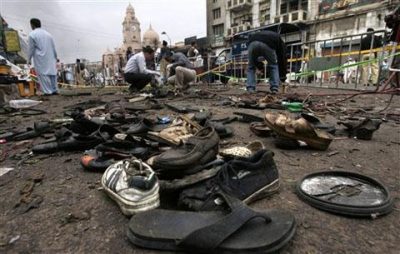By
Sattar Rind
It has now been over a year since Pakistan’s comprehensive joint military operation, Zarb-e-Azb (sharp and cutting strike), began. This operation is against local or foreign militants who are hiding in the safe havens of North Waziristan and other parts of the Pak-Afghan Border areas.
The operation was against the will of Prime Minister Nawaz Sharif, though most political parties in Pakistan supported it; at least they did so publicly.
As a consequence the overall security situation improved with fewer terrorist attacks in Pakistan. However, in retaliation to this operation, the 2014 attack on a school in Peshawar by the Taliban was severe and had a great impact, not only on the nation, but also internationally.
Following this wretched attack a National Action Plan (NAP) emerged to flush out the militants from Pakistan, but no action at grass roots level was taken. Even Mullah Aziz of ‘Lal Masjid (Red Mosque) Islamabad’ fame had openly supported the Peshawar attack, justifying it by saying that family members were also being killed so why then not the killers of the Taliban feel the same pain also?
The Civil Society activists for days protested against such a statement and demanded that Mullah Aziz be arrested, but ultimately failed miserably in doing so. Throughout this, none of the Madrasas, the manufacturing factories of militant forces, were banned or hate speeches stopped against the minorities, particularly the Muslim Shiites.
Despite this, the Interior Minister Col Shuja Khanzada, 71, was active in implementing the NAP against militants and received threats for doing so. These continued, particularly following the death of Malik Ishaq, the leader of terrorist organisation Lashkar-e-Jhangvi (LeJ) when he was gunned down by police in an encounter last month in the Punjab northern city of Muzaffargarh.
The brave and bold Shuja Khanzada’s response against such threats was that he would not come under pressure and would fight against the militants destroying the country’s peace and harmony.
Unfortunately, Khanzada was killed in a suicidal attack this weekend when he was attending a meeting with local people in his own village Shadikhan, barely 75 kilometres from the capital city of Islamabad and Army HQ in Rawalpindi.
Khanzada’s village lies on the edge of the two province border of Punjab and Pakhtunkhwa. A suicide attacker reportedly entered his sitting/meeting room where he detonated the bomb, the resulting blast bringing down the roof of the house killing the provincial Minister along with at least eighteen others.
Sources were quoted in different newspapers that the LeJ terrorist group was behind the suicide attack, reportedly associated with the Talban and Al-Qaeda also, in addition to recently having developed contact with ISIS militants also. The group carried out the attack in retaliation to the killing of its leader Malik Iahaq, killed last month along with his two sons and deputies.
Despite this however, a splinter group of the Taliban Jamaat-ul-Ahrar has confirmed that they carried out the attacked on Shuja Khanzada.
Pakistan’s Prime Minister Nawaz Sharif and Chief of Army Staff General Raheel Sharif condemned the attack and reiterated their commitment and determination that the government will peruse the National Action Plan with full strength against the terrorists.
Security has been tightened for the Prime Minister and his younger brother Chief Minister Shehbaz Sharif as they might be the terrorist’s next target. This is particularly the case following a report that appeared in a national newspaper that Shehbaz Sharif was briefed in a Police Collage Sihala that he may be the next target of militants.
It seems that a new spell of terrorist attacks has started and will continue following the death of the Interior Minister of Punjab.
If we look at this in perspective we could conclude that terrorism is part of a ‘bigger picture’ which has been going on following the withdrawal of the Soviets from Afghanistan in 1989. This is believed mainly to access the Central Asian countries that are rich in oil and mineral resources.
This is again enhanced by the US following their attack on Iraq, following the baseless allegations of Weapons of Mass Destruction that Iraq were alleged to have had, in turn being a great threat to the US. However, no such evidence has ever been found, the social and political fabric of Iraq having been destroyed following the US troops’ invasion.
Nevertheless the Pakistan Army are seen as strong and that they could not be defeated by the Taliban, Al-Qaeda or ISIS. However one cannot rule out the effect already felt following the killings and loss of innocent lives of its fellow countrymen, Pakistan in this respect having already paid a huge price.
Sattar Rind
Sattar Rind lives in Sindh, Pakistan. and is an Author with four books to his credit. three poetry and one on politics. As a Columnist he has written for a number of newspapers and magazines since 1991. Sattar can be contacted at the following email address: [email protected]



No Comments Yet!
You can be first to comment this post!